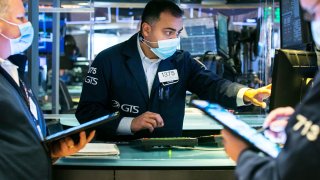
- "That dichotomy of the economy winning and the stock market losing, I don't think investors have their minds wrapped around that at all," said Cole Smead, president of Smead Capital Management.
- His comments came off the back of a sharp rise in the yield on the benchmark 10-year Treasury note last week.
Stock markets wobbled last week as U.S. Treasury yields rose, and one fund manager has warned that equity investors are ill-prepared for the "pain" that's coming.
Cole Smead, president of Smead Capital Management, told CNBC Tuesday that investors needed to balance whether a company is positively impacted by the economic recovery, or negatively impacted by how these recoveries affect "the price of money."
"That dichotomy of the economy winning and the stock market losing, I don't think investors have their minds wrapped around that at all," Smead said.
Get Connecticut local news, weather forecasts and entertainment stories to your inbox. Sign up for NBC Connecticut newsletters.
His comments come off the back of a sharp rise in the yield on the benchmark 10-year Treasury note last week. The move, which was driven by the rollout of vaccines and hopes of pent up demand, boosted growth and inflation expectations and knocked risk assets, as investors began to consider the possibility of central banks tightening monetary policy.
Stocks can often fall as rates rise as large firms have to pay more to service their debts, causing investors to reassess the trading environment.
Money Report
The rise in yields mellowed somewhat late on Monday and the 10-year yield was sitting at around 1.4256% on Tuesday afternoon in Europe, close to levels seen a year ago as the Covid-19 pandemic began to spread across the globe.
However, Smead flagged that in late 2018, the 10-year was yielding above 3%, indicating that momentum returning to the underlying economy could have a greater adverse effect on the stock market.
"I'm 37 and most people my age have never seen a nasty bear market in their life. They hardly could catch their breath in the spring but they have never seen really terrible equity markets and they've never seen bonds lose money," he added.
"I think most investors just aren't prepared for this, because dogs chase cars and people chase stocks, it's just the nature of the beast."
The recent increase in yields has driven a further rotation into so-called cyclical stocks, whose performance tends to align with the strength of the broader economy, such as energy and financials. Smead suggested that while "market risk looks terrible, investment risk looks wonderful," noting that his firm had been buying shares of mall operators such as Simon at cheap valuations.
"That is just a very different conversation than saying: 'Well what are the S&P 500 earnings going to be next year?' And only god knows what someone is going to pay on a valuation basis for those earnings," he said.
The majority of U.S. blue chip companies that have reported full-year 2020 earnings in recent weeks have exceeded analyst expectations. However, Smead suggested that market valuations had come unmoored from such fundamentals, and could be vulnerable if the economic recovery furthers recent rises in bond yields.
"The detachment of the S&P 500 to the tangible or the intangible assets today, there is no relationship between those assets and the price of stocks as it pertains to the market," he said.
"I think that is where the damage of stocks will come — if people wake up to that. We could see quite a bit of hell and pain being handed out over the next two to three years," Smead added.






